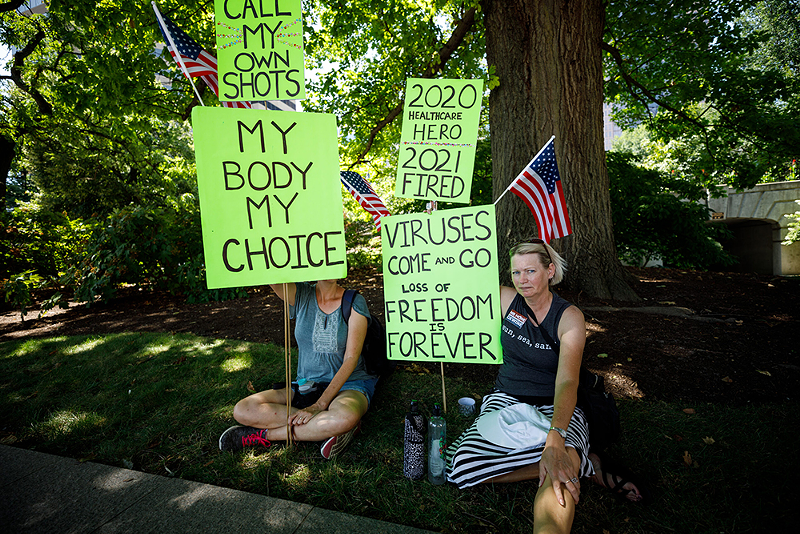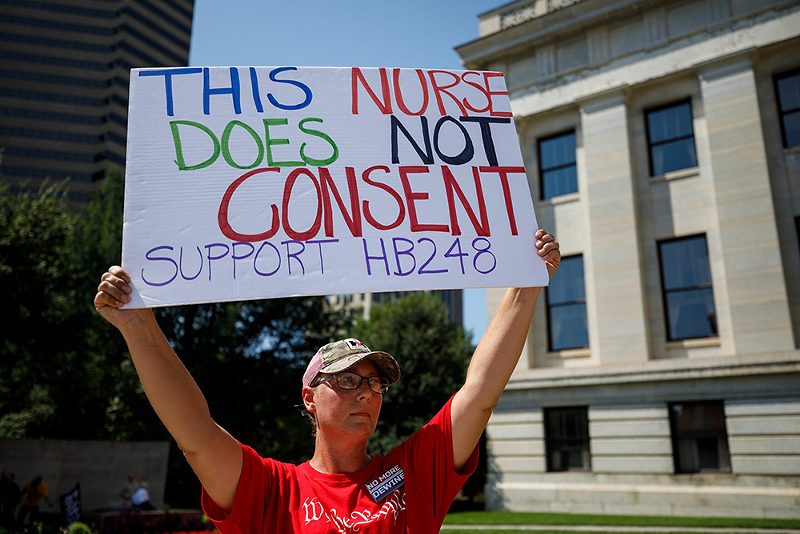
One day after the Ohio House Speaker announced a “pause” on a sweeping anti-vaccination bill — House Bill 248 — the House Health Committee spent five hours Tuesday fielding testimony laden with medical claims about vaccines that are diametrically opposed to guidance from state and federal health officials.
While the hearing, the bill’s sixth, was ostensibly about legislation, vaccines themselves were on trial throughout. Various physicians and public health officials testified to vaccines’ lifesaving capabilities, and bill supporters — including several nurses, anti-vaccination activists and a priest — characterized vaccines as inefficacious, insufficiently researched and possibly dangerous.
One witness, Christine Ankenbauer, inaccurately claimed to lawmakers a cure exists for COVID-19 (various treatments are available but no “cure”). One man, Damon Appel, said he planned to start a “church of the exempted” shortly before referring to Rep. Beth Liston, a Democrat and practicing physician, as a “fascist distractor” — House Health Chairman Scott Lipps (R-Franklin) subsequently kicked Appel out of the hearing.
“We’re pandering to extreme groups,” Liston said in an interview after the hearing.
In questioning witnesses, several Republican lawmakers made clear their hostile attitudes toward vaccination. Rep. Jennifer Gross (R-West Chester Twp.), who sponsored the bill, asked one opponent why employers who mandate vaccines don’t also mandate proper diet to avoid heart disease.
Rep. Tom Young (R-Washington Twp.) at one point seemed to imply that vaccines kill children while questioning Sarah Kincaid, a representative of the Ohio Children’s Hospital Association.
“I can’t imagine seeing children die in a hospital, it must be gut wrenching,” he said. “But on the other hand, isn’t it just as important for us to be aware of the fact that taking the vaccine has killed children as well?”
Kincaid appeared taken aback by the question. The COVID-19 vaccine is not available to children under 12, and public health research has found deaths caused by vaccines to be extraordinarily rare.
“I’m not aware of any confirmed cases by the CDC that have indicated child death from the vaccine,” she said.

The bill’s path forward is unclear. Lipps indicated work is ongoing and House leadership is assessing support for various amendments. After the hearing, Lipps said he would take questions from reporters before exiting a side door from the hearing room. Staff later said he left. He did not respond to a phone call.
As Tuesday’s action occurred, the Ohio Department of Health released data showing a COVID-19 surge reaching daily infection rates not seen since February, and the CDC released a study from Los Angeles finding that unvaccinated residents there were five times more likely to be infected and 29 times more likely to be hospitalized with COVID-19 than their vaccinated peers.
As the committee met inside, hundreds of proponents of the legislation, House Bill 248, wrapped around the Statehouse despite the hot August sun to tout “medical freedom” and voice opposition to employers (mostly hospitals and nursing homes) requiring vaccination among their staff. Several described this as an attack on their liberty in interviews.
The legislation would block employers, colleges, insurers, hospitals, and others from requiring, incentivizing, or asking about the vaccination status of their employees. This applies to vaccines against all disease, not just COVID-19. Health experts say this will only hinder vaccination efforts and leave more Ohioans vulnerable to infectious disease.
It would also prevent businesses and other entities from treating vaccinated and unvaccinated people differently, including in terms of masks or social distancing.
Tuesday’s events illuminated a schism within the Ohio Republican Party as it relates to vaccination. The hearing, a lone flash of legislative activity during summer recess, was billed as “urgent” when the committee chairman announced it earlier this month.
In contrast, House Speaker Bob Cupp (R-Lima) announced Monday that while the legislation is “important to many members of” the House Republican caucus, there will be no amendments or votes Tuesday. He said the bill is now under a “pause” to further consider the issue.

The Ohio Chamber of Commerce, a powerful association typically aligned with Republicans that is now headed by former GOP Congressman Steve Stivers, reiterated its opposition to the bill in a statement earlier this month.
“It’s time for lawmakers to stop trying to dictate workplace policies that interfere with the ability of employers to ensure the safety and wellbeing of employees and others who enter places of business,” Stivers said. “Businesses continue to do the best they can in responding to the many challenges and consequences of the COVID crisis. They don’t need to be micro-managed by the government telling them how to best run their business.”
However, anti-vaccination activists have mounted pressure from the right in support of the bill. Former state lawmaker Candice Keller, a far-right politician from Butler County with a history of bombastic and misleading statements on voter fraud and vaccination, staged protests in Lipps’ hometown pledging to organize a primary against him if he fails to host a hearing on the bill, according to posts on her “Patriot America” Facebook page.
She also claimed that Rep. Thomas Hall, a Republican from Madison Township and the youngest member of the caucus, told her at a recent rally she organized that he would gather signatures from 50 lawmakers to forcefully discharge the bill from committee and onto the House floor.
Hall did not respond to multiple requests for comment. Keller did not respond to phone calls.
Rep. Brian Stewart (R-Ashville) acted as a lone voice defending the science behind vaccination among Republicans on the committee. Speaking to one witness who repeatedly claimed the vaccines don’t prevent COVID-19, he questioned why nearly everyone hospitalized with COVID-19 is unvaccinated.
“Your testimony is the vaccine doesn’t work, and the data isn’t bearing that out,” he said.
After the hearing, he declined to comment when asked whether it’s farcical to host five hours of testimony so rife with misinformation on a bill with unwritten amendments pending. He said the Republican Party hasn’t shifted on vaccination, but a faction of the party is turning up the volume.
“I think there has always been a segment (of the Republican Party) that has been more hostile to vaccines, and I think it’s somewhat inevitable during a pandemic that that view is going to be magnified,” he said after the hearing.
Rep. Allison Russo (D-Columbus) said the bill is “incredibly expansive” and ignores religious and medical protections from vaccine mandates that currently exist in law.
“We again heard a lot of vaccine misinformation and conspiracy during testimony today and basing Ohio policy on these extreme views while ignoring the information presented by our medical and public health community is bad for the health of every Ohioan,” she said in a statement.

Outside the Statehouse, several demonstrators said employers have no right to force employees to choose between vaccination and their livelihoods. Of four activists interviewed, all four said they are not vaccinated against COVID-19, would not recommend vaccination against COVID-19, but said they are not “anti-vaccine.”
Some nurses appeared at the rally as well, like April Gross, a former nurse with Premier Health. She said she quit her job instead of complying with a COVID-19 vaccine requirement. Tammy Corzine, another nurse, said she isn’t facing any vaccination mandate yet, but she’d sooner quit than take the vaccine.
Politicians came too. Ohio U.S. Senate Candidate Josh Mandel made an appearance, as did Jonah Shulz, who is one candidate challenging U.S. Rep. Anthony Gonzalez, one of few congressional Republicans who voted for the second impeachment of then-President Donald Trump.
Paige Simmons, a nurse who testified at the hearing, said all vaccines — even the polio vaccine — should be a choice for parents.
“The majority of us nurses are not anti-vax,” she said. “We’re pro-choice.”
This story was originally published by the Ohio Capital Journal and republished here with permission.
Sign up for our weekly newsletters to get the latest on the news, things to do and places to eat delivered right to your inbox.
Follow us on Facebook, Twitter and Instagram.





